第10章 CHAPTER III(4)
Much of my time was spent with the children and nurses of the family which occupied the chateau. The costume of the head nurse with her high Normandy cap (would that I had a female pen for details) invariably suggested to me that she would make any English showman's fortune, if he could only exhibit her stuffed. At the cottage they called her 'La Grosse Normande.' Not knowing her by any other name, I always so addressed her. She was not very quick-witted, but I think she a little resented my familiarity, and retaliated by comparisons between her compatriots and mine, always in a tone derogatory to the latter. She informed me as a matter of history, patent to all nurses, that the English race were notoriously bow-legged; and that this was due to the vicious practice of allowing children to use their legs before the gristle had become bone. Being of an inquiring turn of mind, I listened with awe to this physiological revelation, and with chastened and depressed spirits made a mental note of our national calamity. Privately I fancied that the mottled and spasmodic legs of Achille - whom she carried in her arms - or at least so much of the infant Pelides' legs as were not enveloped in a napkin, gave every promise of refuting her generalisation.
One of my amusements was to set brick traps for small birds.
At Holkham in the winter time, by baiting with a few grains of corn, I and my brothers used, in this way, to capture robins, hedge-sparrows, and tits. Not far from the chateau was a large osier bed, resorted to by flocks of the common sparrow. Here I set my traps. But it being summer time, and (as I complained when twitted with want of success) French birds being too stupid to know what the traps were for, I never caught a feather. Now this osier bed was a favourite game covert for the sportsmen of the chateau; and what was my delight and astonishment when one morning I found a dead hare with its head under the fallen brick of my trap. How triumphantly I dragged it home, and showed it to Rose and Auguste, - who more than the rest had 'mocked themselves' of my traps, and then carried it in my arms, all bloody as it was (I could not make out how both its hind legs were broken) into the salon to show it to the old Marquise. Mademoiselle Henriette, who was there, gave a little scream (for effect) at sight of the blood. Everybody was pleased. But when I overheard Rose's SOTTO VOCE to the Marquise: 'Comme ils sont gentils!' I indignantly retorted that 'it wasn't kind of the hare at all: it was entirely due to my skill in setting the traps. They would catch anything that put its head into them. Just you try.'
How severe are the shocks of early disillusionment! It was not until long after the hare was skinned, roasted, served as CIVET and as PUREE that I discovered the truth. I was not at all grateful to the gentlemen of the chateau whose dupe I had been; was even wrath with my dear old 'Maman' for treating them with extra courtesy for their kindness to her PETIT CHERI.
That was a happy summer. After it was ended, and it was time for me to return to England and begin my education for the Navy I never again set eyes on Larue, or that charming nest of old ladies who had done their utmost to spoil me. Many and many a time have I been to Paris, but nothing could tempt me to visit Larue. So it is with me. Often have I questioned the truth of the NESSUN MAGGIOR DOLORE than the memory of happy times in the midst of sorry ones. The thought of happiness, it would seem, should surely make us happier, and yet - not of happiness for ever lost. And are not the deepening shades of our declining sun deepened by youth's contrast? Whatever our sweetest songs may tell us of, we are the sadder for our sweetest memories. The grass can never be as green again to eyes grown watery. The lambs that skipped when we did were long since served as mutton.
And if Die Fusse tragen mich so muthig nicht empor Die hohen Stufen die ich kindisch ubersprang, why, I will take the fact for granted. My youth is fled, my friends are dead. The daisies and the snows whiten by turns the grave of him or her - the dearest I have loved. Shall I make a pilgrimage to that sepulchre? Drop futile tears upon it? Will they warm what is no more? I for one have not the heart for that. Happily life has something else for us to do. Happily 'tis best to do it.